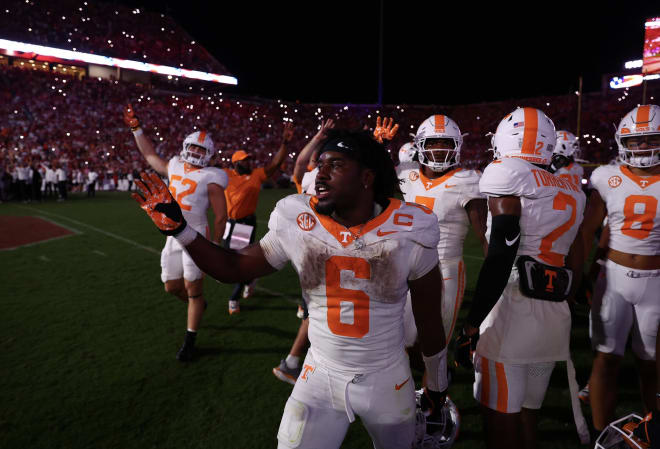His first touch of a late second quarter drive at Oklahoma two weeks ago went for no gain as the Sooners continued to hold Tennessee’s vaunted run game and its stellar running back in check in a low-scoring first half.
TALK ABOUT IT IN THE ROCKY TOP FORUM
A year ago, Sampson might have felt he needed to break off a big run in a similar situation. Instead, he put his head down on the next carry and picked up 8 yards. The yards started to pile up and on the sixth play of a drive that Sampson accounted for every yard, he scored on a 1-yard touchdown run that stretched the Vols’ lead just before halftime.
Sampson, who entered the game with four-straight 100 or more yard performances, only totaled 92 yards in Tennessee’s 25-15 victory and 46 of those yards came on that one drive. But for Sampson, it was the kind of performance he likely wouldn’t have been able to have in the previous two years had it not been for a chance in his approach as the Vols’ now feature back.
“Coming out of high school, you’re used to hitting all of the big runs,” Sampson said. “You’ve got to get used to getting the dirty three (yards), the dirty four (yards) because that keeps the chains moving. So that’s what I got better at, just between the tackles, understanding that every play isn’t going to be a home run.”
Sampson can still hit home runs.
He leads the FBS in scoring with 10 touchdowns, three of which have come from 14, 22 and 34 yards and is already within striking distance of a 95-year program record for rushing scores set by Gene McEver in 1929.
Sampson is averaging 6.5 yards per carry and more than 112 yards per game, but it’s what he’s doing to sustain drives–like he did against Oklahoma–that has been key to the Vols’ success on the ground.
“He’s always been an elite competitor, been able to reset and go play the next play,” Josh Heupel said. “I do think his off-season this year, continuing to add size and strength to his frame has allowed him to handle a situation a little bit different than his freshman year would’ve played out. But he’s got great trust in the guys in front of him.
“We have great trust in him. And on that drive, obviously, he was a difference-maker during the course of that drive.”
Sampson had to bide his time for the kind of season he is having now.
He showed promise as a freshman in 2022 and took a bulk of the No. 2 carries behind 1,000-yard rusher Jaylen Wright last season. Sampson isn’t only getting most of the carries in his third season (69 through games), he has given the coaching staff little reason to take him off of the field.
Part of that is because of injuries elsewhere in the room. Cam Seldon, who was expected to next in line behind Sampson, missed all of spring and was limited through much of fall camp before another injury forced him to miss two games.
Red-shirt freshman DeSean Bishop has seemingly done enough to keep the second spot in the rotation that he has been playing in, but Sampson is OK with being an every-down back.
“You get boosted once you start getting into enemy territory,” Sampson said. “You start to get close to the red zone. I always try to make those big plays. I really don’t want to get pulled out of the game. I want them to be able to hand the ball to me once we get down there and put on for my team…Just hungry to get in the end zone.”









